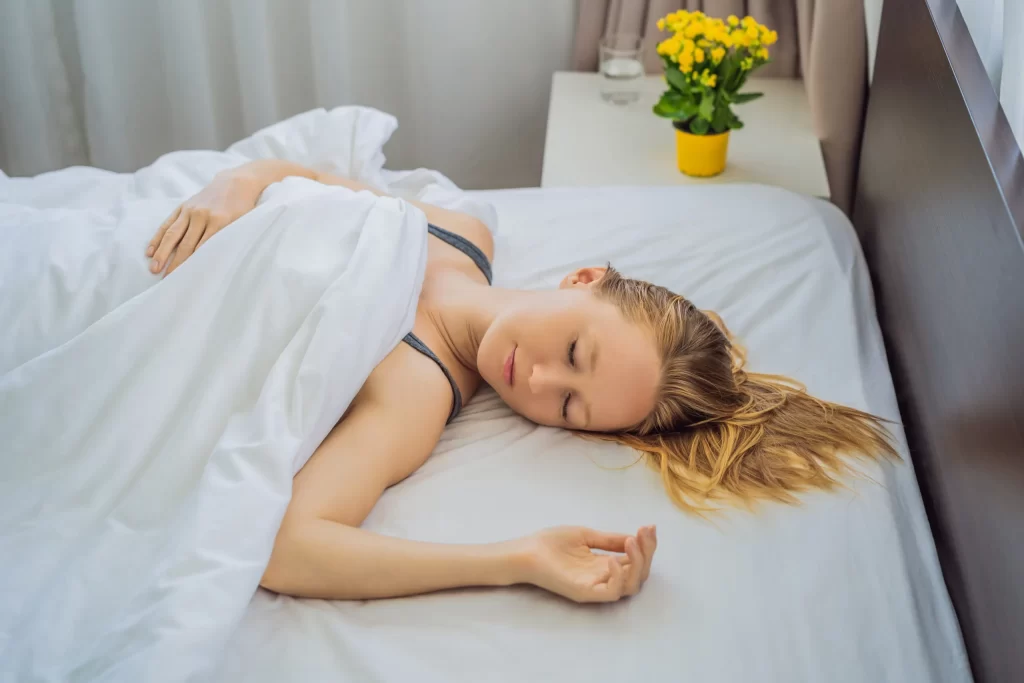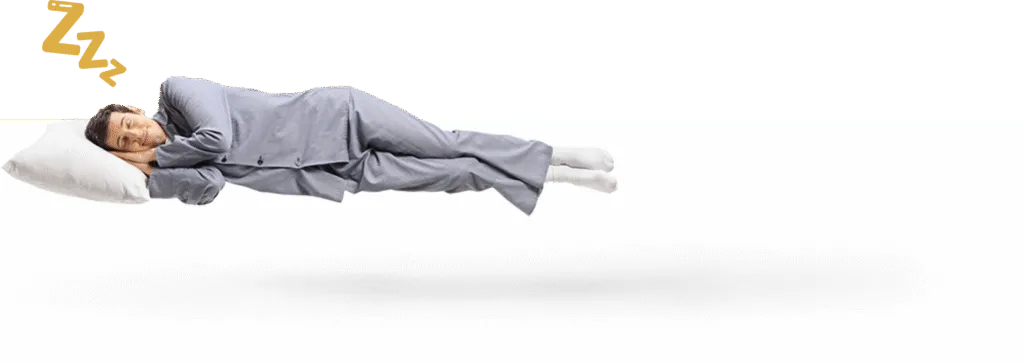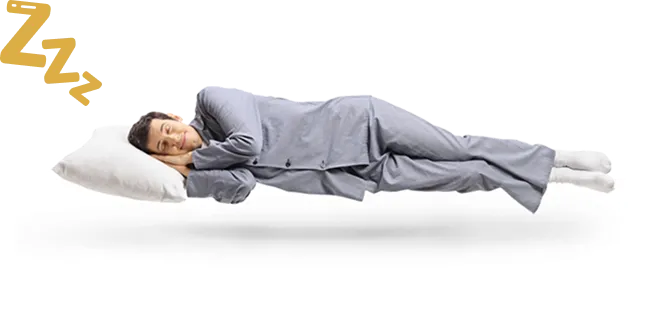Mattress Science
April 20237 Sleep Myths Exposed: Misconceptions about sleeping tips
Sleep Hacks Uncovered
- Why is sleep so important?
- What are the common misconceptions about sleep?
- Can I catch up on lost sleep?
- Do you need less sleep as you get older?
- Is snoring really harmless?
- Can alcohol help you sleep?
- Some people need less sleep than others
- Can you train yourself to need less sleep?
- Can watching TV send you to sleep?
- Does ‘sleep banking’ actually work?
Why is sleep so important?
Sleep is essential for maintaining good physical and mental health. Sleep is the backbone of rest and recovery for nearly all living beings allowing us to be healthy and function correctly during the day.
According to the National Heart, Lung, and Blood Institute (NHLBI), during sleep, the body is working to support healthy brain function and maintain physical health. The body and mind recharge during sleep, leaving you refreshed and alert when you wake up. Good sleep improves brain performance, mood, and health. Sleep also helps support growth and development in children and teens.
Inadequate sleep over time can raise the risk for chronic health problems. Without enough sleep, the brain cannot function properly, impairing the ability to concentrate, think clearly, and process memories. Additionally, not getting enough quality sleep regularly raises the risk of many diseases and disorders, including heart disease, stroke, obesity, and dementia. If you’ve ever experienced brain fog from a disturbed nights sleep, or being irritably tired from jet lag you’ll know what a lack of sleep can do to your mental state!

What are common misconceptions about sleep?
We’ve scoured the internet along with using our decades of sleep and mattress design to bring you the most common sleep misconceptions. Some of these may blow your mind but you’re guaranteed one thing; you’ll sleep far better avoiding some of these myths. At John Ryan By Design, we want everyone to get the very best night’s sleep, whether that’s choosing an amazing handmade mattress or simply tweaking your bedtime routine. We’re here to help you sleep better.
So without further a do let’s take a look at the top 7 sleep myths and how to avoid falling into their sleep traps!
Misconception #1: You can catch up on lost sleep on the weekends.
Many people believe that they can make up for lost sleep during the week by sleeping in on the weekends. However, this is not entirely true. While it is possible to catch up on some sleep, it is not a long-term solution for chronic sleep deprivation.
Sleeping in on the weekends can disrupt your natural sleep-wake cycle, making it harder to fall asleep and stay asleep during the week. It is better to aim for a consistent sleep schedule, even on the weekends, to maintain good sleep habits.

Misconception #2 You need less sleep as you get older.
While it is true that older adults may have more difficulty falling asleep and staying asleep, they still need the same amount of sleep as younger adults. According to the National Sleep Foundation, adults aged 65 and older should aim for 7-8 hours of sleep per night. Lack of sleep can lead to a range of health problems, including memory and cognitive impairment, depression, and an increased risk of falls.
Misconception #3: Snoring is harmless.
Many people believe that snoring is harmless and nothing to worry about. However, snoring can be a sign of sleep apnea, a sleep disorder that causes breathing to stop and start during sleep. Sleep apnea can lead to a range of health problems, including high blood pressure, heart disease, and stroke. If you or your partner snore regularly, it is worth talking to your doctor to see if further investigation is needed.

Misconception #4: Alcohol helps you sleep.
While alcohol may help you fall asleep faster, it can actually disrupt your sleep cycle and lead to poor-quality sleep. Alcohol can also cause snoring and sleep apnea, which can further disrupt your sleep. It is better to avoid alcohol before bedtime and stick to a consistent sleep schedule to maintain good sleep habits.

Misconception #5: You can function on very little sleep.
Many people believe that they can function well on very little sleep, but this is not entirely true. While some people may be able to cope with less sleep than others, chronic sleep deprivation can lead to a range of health problems, including depression, anxiety, and an increased risk of accidents and injuries. It is important to prioritize sleep and aim for 7-8 hours of sleep per night to maintain good health and well-being.
Misconception #6: You can train yourself to need less sleep.
While it is possible to adjust your sleep habits and improve the quality of your sleep, you cannot train yourself to need less sleep. Sleep is a biological necessity, and everyone needs a certain amount of sleep to function properly. Trying to cut back on sleep can lead to a range of health problems and may actually make it harder to function during the day.
Misconception #7: Watching TV in bed helps you relax and fall asleep.
Many people believe that watching TV in bed helps them relax and fall asleep. However, the blue light emitted by electronic devices can actually disrupt your sleep cycle and make it harder to fall asleep. It is better to avoid electronic devices before bedtime and create a relaxing bedtime routine to help you fall asleep naturally.

Several studies have shown that using electronic devices with screens, such as TVs, before bed can increase sleep latency, reduce sleep duration, and cause poor sleep quality. Furthermore, sleeping with the TV on can disrupt dreams, hormones, and health, and increase sleep debt. Therefore, it is recommended to avoid watching TV before bed to promote healthy and restful sleep.
Playing catch up with sleep on weekends can disrupt your sleep cycle, you’re better off sleeping consistently through the week
Alcohol and sleeping with the TV on all negatively affect your sleep quality. Aim to sleep between 6-8 hours each night of the week.


What is Sleep Banking?
The idea of sleep banking is a controversial topic in the field of sleep science, with some experts arguing that it is not possible to “bank” sleep, while others believe that it may be possible to some extent.
The concept of sleep banking suggests that you can make up for lost sleep by getting extra sleep before or after a period of sleep deprivation. For example, if you only get five hours of sleep one night, you could “bank” an extra two hours of sleep the following night to make up for it.
While some studies have suggested that extra sleep can help improve cognitive function and mood after a period of sleep deprivation, it is not clear whether this actually constitutes “banking” sleep. Additionally, there are limits to how much sleep you can realistically make up for at one time, as sleeping for long periods of time can disrupt your natural sleep-wake cycle and lead to other sleep problems.
Overall, the idea of sleep banking is not yet fully understood, and there is no clear consensus among experts in the field of sleep science. While getting extra sleep after a period of sleep deprivation may help improve your overall well-being, it is not a substitute for consistently getting enough sleep on a regular basis.
Summary
In conclusion, there are many misconceptions and myths surrounding sleep. Some of them have been passed down from generation to generation, causing all sorts of old wives’ tales when it comes to sleep.
It is important to prioritize sleep and aim for a consistent sleep schedule to maintain good sleep habits. So by kicking these habits to the curb and putting a solid focus on your sleep regime you can live a healthier life. After all who doesn’t want to take on the world refreshed, full of energy and vigour?
One final tip is to make sure you’ve picked the perfect mattress before starting your new sleep regime to ensure it’s the right fit for you.
If you need more mattress help when choosing a new bed then why not give our small friendly team a call on 0161 437 4419 or drop us a message below for more help?

Dreaming of the perfect nights sleep?

Ask us a question
There are over 6000 questions and answers submitted by you on all questions about mattresses and bed problems. Enter a keyword such as Vi Spring, John Lewis beds, bad back or Memory Foam and see if your question has already been answered.
If you can’t find an answer in knowledge hub, ask a new question. We aim to respond to all questions within one working day.
Newsletter
Enter your email to join our newsletter. We’ll send you occasional news and mattress expertise.
